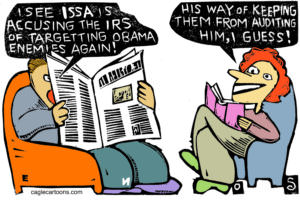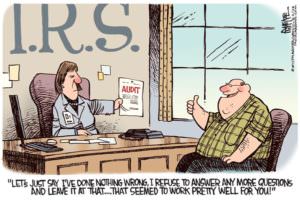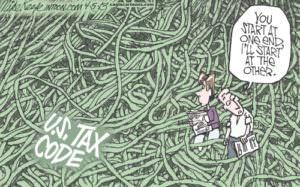Trump to Name IRS Commissioner Who Will Oversee His Audit
Treasury Secretary Steve Mnuchin may be a candidate for the position. Getty Images
Getty Images
When IRS Commissioner John Koskinen’s term expires Nov. 12, President Trump will choose a new leader who will oversee both the president’s plan for tax cuts as well as the audit of his own tax returns. This follows Trump’s controversial decision to break decades of precedent and withhold his return from the American people during his campaign and presidency. Since the 1970’s, the IRS has routinely audited the tax returns of both the president and vice president.
Though Trump has not nominated anyone for the IRS Commissioner position, Bloomberg notes that Secretary of Treasury Steven Mnuchin is a possible candidate, which could be problematic if it leads Congress to believe that Trump is attempting to influence the overseeing of his audit:
The nomination will be even more important if Trump can persuade lawmakers to pass the “historic” tax overhaul he promised in an Indiana speech on Wednesday, legislation that would cut rates for corporations and individuals and simplify returns. The new IRS commissioner will be responsible for making sure computer systems and documents at the IRS are updated, staff are trained in the nuances of the law and filing season proceeds without a hitch.
Until the Senate confirms a permanent replacement for Koskinen, the post cannot remain vacant in the meantime—the Internal Revenue Code requires the president to appoint an acting head.
Bloomberg predicts that current IRS auditors will not take kindly to the Trump administration’s tendency toward political meddling:
A commissioner who tried to interfere in either the Russia investigation or Trump’s audit would likely be foiled, former leaders of the agency said.
“The career folks at the IRS are not going to let anybody come into the organization, appointee or not, and tell them who and what they have to do in the way of examining someone,” said Lawrence Gibbs, who worked at the IRS for 17 years, including as the commissioner in the 1980s.
Trump is not the first president with a personal stake in his IRS audit. Mark Iwry, who served as a senior adviser and deputy assistant secretary for tax policy at the Treasury under Barack Obama, said, “The IRS pushed back when Nixon tried to exert political influence; that reinforced the probity of the IRS. IRS personnel know very well that improperly favoring or disfavoring a particular taxpayer would be absolutely wrong and contrary to IRS’s mission and decades of IRS practice and adherence to principle.”
Shortly after the 2016 election, Politico predicted that Trump might try to manipulate the way the IRS audited the Clinton Foundation:
It’s mostly political norms that insulate the IRS from the White House: The taint of the years when Richard Nixon tried to get the agency to harass his enemies has cast a long shadow. But Trump suggested on the campaign trail that he would pursue investigations of his opponent, Hillary Clinton, and the IRS is already thought to be examining the Clinton Foundation.
There is a law on the books expressly prohibiting the president and his staff from asking the IRS to audit or stop an audit of a given taxpayer. But there are almost certainly ways around that, according to David Herzig, a law professor at Valparaiso University.
“For him to say, ‘I’m going to audit the Clinton Foundation,’ that theoretically could violate” the statute, Herzig said. “But if he said ‘I’m only going to hire an IRS commissioner that’s going to follow my rules of not auditing presidents and auditing certain foundations with donations from foreign donors,’ I’m not sure that does.”
Advocacy groups such as People for the American Way are demanding that “President Trump not be allowed to unilaterally install an ally as Acting Commissioner of the IRS. We call upon the Senate to perform its Constitutional role and advise the president to retain Commissioner Koskinen until there is a Senate confirmed successor.”
Your support matters…Independent journalism is under threat and overshadowed by heavily funded mainstream media.
You can help level the playing field. Become a member.
Your tax-deductible contribution keeps us digging beneath the headlines to give you thought-provoking, investigative reporting and analysis that unearths what's really happening- without compromise.
Give today to support our courageous, independent journalists.






You need to be a supporter to comment.
There are currently no responses to this article.
Be the first to respond.